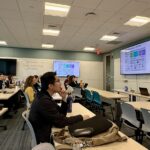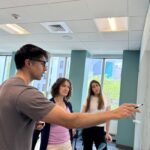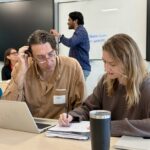Future Developers Meeting
Organizers: Olga Vitek and Michael Shortreed
Returning for 2026: Future Developers Meeting
This workshop brings together developers (and aspiring developers) of computational and statistical tools for mass spectrometry, proteomics and metabolomics. The program will include tutorials by leading developers of tools, invited oral presentations, oral and poster presentations selected from submitted abstracts, a panel discussion, as well as ample opportunities for informal interactions..
We invite everyone to submit abstracts describing tools for mass spectrometry, proteomics and metabolomics. Of particular interest are topics such as integration of downstream analysis tools, methods and advances in quantitative mass spectrometry, and integration of spatial modalities, however all topics are welcome. The abstracts should focus less on the specific functionality, and more on the design of tools and methods, and its strategy for enabling reproducible research, sustainability, and inter-operability with other computational tools.
A subset of the abstracts will be selected for oral or poster presentations. All accepted presenters will receive a free admission to this part of the program.
Target audience
Anyone interested in developing computational and statistical tools for mass spectrometry, proteomics and metabolomics.
Meeting Agenda
Below is the draft of the 2026 meeting agenda. More updates and additions will be posted here soon.
Location: Northeastern University’s Boston Campus, West Village Complex H, Rooms TBA
Friday, May 8, 2026
| May 8, 9:00am – 12:30pm | Tutorial: [Deep learning models for understanding protein interaction networks and phenotype-driven diagnosis of rare genetic diseases]
Description coming soon Speaker: Michelle Li There will be a 30-minute break from 10:30AM – 11:00AM with light refreshments. |
| May 8, 12:30pm – 1:30pm | Lunch break and posters |
| May 8, 1:30pm – 5:00pm | Tutorial: [Integration of structural predictions and protein interactions for interpretation and discovery]
Description coming soon Speaker: Ed Huttlin There will be a 30-minute break from 3:00PM – 3:30PM with light refreshments. |
| May 8, 6:00pm – 9:00pm | Future developers meeting dinner and scientific panel Location: TBD, all participants are invited. |
Saturday, May 9
| May 9, 9:00am – 10:30am | Tutorial: Coming Soon Coming Soon Speaker: Coming Soon |
| May 9, 10:30am – 11:00am | Break and Refreshments |
| May 9, 11:00am – 11:30am | Invited speaker: Coming Soon
Title and Abstract Coming Soon |
| May 9, 11:30am – 12:00pm | Invited speaker: Coming Soon
Title and Abstract Coming Soon |
| May 9, 12:00pm – 12:30pm | Invited speaker: Coming Soon
Title and Abstract Coming Soon |
| May 11, 12:30pm – 1:30pm | Lunch break and mini poster presentations |
| May 11, 1:30pm – 1:50pm | Contributed Talk: Coming soon
Title and Abstract Coming Soon |
| May 11, 1:50pm – 2:10pm | Contributed Talk: Coming soon
Title and Abstract Coming Soon |
| May 11, 2:10pm – 2:30pm | Contributed Talk: Coming soon
Title and Abstract Coming Soon |
| May 11, 2:30pm – 2:50pm | Contributed Talk: Coming soon
Title and Abstract Coming Soon |
Practical Details
Application
You may apply to attend the Future Developers Meeting via the May Institute application form. Deadlines are the same as for May Institute.
Talk/Poster Requirements
Must be your original research. Talks should be 15 minutes or less. Posters size roughly A0. Please include a max 1 page abstract with your application, or email it to mayinstitute@ccs.neu.edu by the May Institute application deadline.
Lunch Pickup form for Students:
TBD
We can pick it up for you if you order and pay online at Northeastern Tatte or Anna’s Locations. Please put the day of pickup as the date of order on the form.




